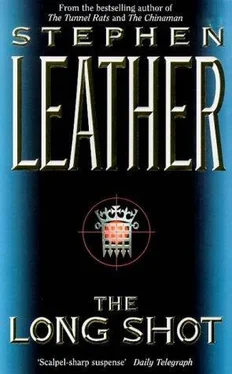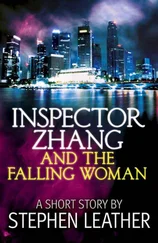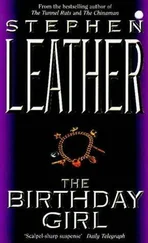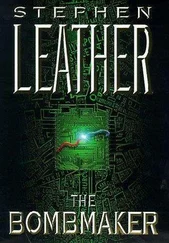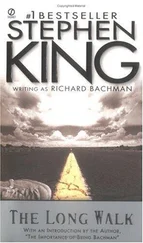Stephen Leather - The Long shot
Здесь есть возможность читать онлайн «Stephen Leather - The Long shot» весь текст электронной книги совершенно бесплатно (целиком полную версию без сокращений). В некоторых случаях можно слушать аудио, скачать через торрент в формате fb2 и присутствует краткое содержание. Жанр: Триллер, на английском языке. Описание произведения, (предисловие) а так же отзывы посетителей доступны на портале библиотеки ЛибКат.
- Название:The Long shot
- Автор:
- Жанр:
- Год:неизвестен
- ISBN:нет данных
- Рейтинг книги:5 / 5. Голосов: 1
-
Избранное:Добавить в избранное
- Отзывы:
-
Ваша оценка:
- 100
- 1
- 2
- 3
- 4
- 5
The Long shot: краткое содержание, описание и аннотация
Предлагаем к чтению аннотацию, описание, краткое содержание или предисловие (зависит от того, что написал сам автор книги «The Long shot»). Если вы не нашли необходимую информацию о книге — напишите в комментариях, мы постараемся отыскать её.
The Long shot — читать онлайн бесплатно полную книгу (весь текст) целиком
Ниже представлен текст книги, разбитый по страницам. Система сохранения места последней прочитанной страницы, позволяет с удобством читать онлайн бесплатно книгу «The Long shot», без необходимости каждый раз заново искать на чём Вы остановились. Поставьте закладку, и сможете в любой момент перейти на страницу, на которой закончили чтение.
Интервал:
Закладка:
Carlos heard the frantic screaming as he lay on his back in his own bedroom, and he smiled. He doubted that Lovell would try to get into Dina’s bed again.
Don Clutesi poured himself a coffee and added three spoonfuls of sugar. “Do you want one?” he asked Frank Sullivan as he stirred.
Sullivan shook his head as he read the FBI file on his desk, and grunted. Clutesi walked up behind him and read over his shoulder. “Mary Hennessy,” he said. “The RUC were looking for her two years ago, weren’t they? Have they found her?”
“They haven’t, but an agent in Phoenix might have,” said Sullivan, still reading. He groped for a photograph and held it by his ear for Clutesi to take.
Clutesi took it and compared it with the photographs in the file. The hair colour was different, but other than that it was clear that they were the same person. “When was this taken?” Clutesi asked.
“Recently,” said Sullivan, “that’s all I know. I don’t even know where he got the picture from,” he said. He handed over a second photograph. “She was with a guy. Recognise him?”
Clutesi took the photograph and shrugged. “Is he IRA too?”
“He’s Matthew Bailey, the IRA guy who tried to buy the missile in LA last year. There’s another man, but I haven’t been able to get a match from our files.” Sullivan showed him the photograph of the moustached man wearing sunglasses who was holding a walkie-talkie to his mouth. “I’m going to ask Phoenix if it’s okay to cross-check with the RUC and MI5.”
A middle-aged man stuck his head around the door. It was Douglas Foulger who worked down the corridor in the Counter-intelligence (Middle East) office. “Yo, Frank, you okay for softball this Saturday?”
“Sure, Doug. Who are we playing?”
“One of the Brooklyn SWAT units,” said Foulger, grinning. “You’d better pack a rod.” He walked into the office, nodding a greeting at Clutesi. He looked at the picture of Mary Hennessy. “Good looking woman,” he said. “She looks experienced, you know?”
“She’s that all right,” said Clutesi. “She’s an IRA terrorist who gets a kick out of torturing undercover agents.” He handed Foulger the other picture, the one of the man with the walkie-talkie. “I don’t suppose you know who this is?” he asked.
Foulger took one look at the picture and sneered at Clutesi. “Get outta here, Don. You’re jerking me around, right?”
Sullivan’s head snapped up. “You know him?”
“Come on you guys, there isn’t an anti-terrorist agent in the world who wouldn’t know who this is.” His mouth dropped. “Jesus H. Christ, are you telling me he’s in the States?”
“Who?” said Clutesi. “Who the fuck is he?”
Foulger held the photograph out in front of him. “Unless I’m very much mistaken, gentlemen, this is Ilich Ramirez Sanchez. Alias Carlos the Jackal.”
Lou Schoelen switched on the small television in his bedroom and adjusted the sound level until he was satisfied that it would cover his voice. Carlos had been insistent that they were all to shun any contact with their friends and relatives until after the hit, but Schoelen thought he was being over-cautious. There was no evidence that anyone was on their trail, and besides, he had a foolproof way of ensuring that any call he made was totally untraceable. Carlos had left the house earlier, Lovell was downstairs watching television in the den, and the Lebanese woman was in her own room.
He pulled his kitbag out from under the bed and unzipped a small pocket from which he took a black plastic box about the size of a paperback book. On one side of the box were twelve grey buttons and on the reverse was a small grille covering a speaker. The electronics inside were quite simple and Schoelen had made the device for a few dollars. All the box did was to generate electric pulses which mimicked those used by the telephone companies. It was quite useless in the hands of someone who didn’t understand how communication networks operated, but Schoelen was no amateur. He flicked open a small notebook and ran his eyes down the columns of figures. It had taken him ten years to gather together the information in the book, swapping numbers with other phone hackers in the same way that children traded baseball cards.
Schoelen dialled the telephone number of an insurance company in Baltimore. He knew that the office would be closed — it was after nine o’clock at night — and that the call would not be answered. He waited until the third ring, then pressed the grille against the mouthpiece of the telephone. With deft movements he pressed twelve keys, one at a time, sending tonal pulses down the line. He put the phone to his ear and listened to a series of clicks which told him that the call was being routed through the Baltimore exchange and across the country to San Francisco. The clicks stopped and he heard the dial tone again, though this tone was being generated by an exchange thousands of miles away. So far as the phone company records would show, he had made a local call to the insurance company and nothing more. He put the box back to the receiver and keyed in a second string of pulses, which again produced a series of clicks. This time the call was being routed down the West Coast to an exchange in Los Angeles. Schoelen ran his finger down to a number of a call-box which he knew was in a line of six such boxes in Long Beach. He keyed in the pulses, and thousands of miles away the phone began to ring. Schoelen’s fingers moved quickly because he had to get the next pulses down the line before the phone was answered. He keyed in another string of twelve pulses which transferred the call to the main San Diego exchange. As the pulses shot across the country at close to the speed of light, the telephone stopped ringing in Long Beach.
Schoelen put the phone to his ear and once again he heard a dial tone. This one was being generated by the San Diego exchange, but if anyone should try to trace the call, the trail would end at the pay phone in Long Beach. The final pulses generated by the black box set the telephone ringing on the hall table in his parents’ house in Coronado. His mother answered on the fifth ring and immediately poured out a torrent of questions in her thick Germanic accent which had changed little during all her years in the United States. Schoelen waited until she’d finished. “Mom, I’m fine,” he said. “No, I don’t know when I’ll be back. How’s Willis?” Schoelen’s dog was the reason for the call. Before he’d left Coronado, his Rottweiler had been off his food and had been listless at night.
“Oh, Lou, he was not so good,” said his mother. “He was sick many times, so we took him to the veterinarian last week. His intestine is twisted, he said.”
Schoelen’s stomach lurched. “He’s okay, isn’t he, Mom?”
“Oh, he’s fine now, he’s back home, but it was expensive, Lou. Eight hundred dollars for the operation and the medicine.”
Schoelen sighed with relief. He had raised the dog from a puppy and loved it with a passion. “That’s okay, Mom. I’ll send you the money in a couple of weeks. Is he eating okay now?”
“Like a horse. We have to take him back next week to have stitches removed, but his stomach is fixed. So, when are you coming home?”
“I don’t know, Mom. This job is very important. It’ll all be over in two weeks though.”
“Willis misses you, Lou. And so do we. Please come home soon.”
“I will, Mom. Say hello to Dad for me. I have to go now.” Schoelen replaced the receiver. On the television screen Captain Kirk and Spock beamed up to the bridge of the Starship Enterprise.
The days of FBI agents wearing telephone company overalls and scaling telephone poles to tap phones disappeared with the advent of digital exchanges. Physical wiretapping was replaced by computerised monitoring, much to the relief of the agents who had previously been forced to spend hours in damp basements or in the back of vans, their ears sweating under too-tight headphones.
Читать дальшеИнтервал:
Закладка:
Похожие книги на «The Long shot»
Представляем Вашему вниманию похожие книги на «The Long shot» списком для выбора. Мы отобрали схожую по названию и смыслу литературу в надежде предоставить читателям больше вариантов отыскать новые, интересные, ещё непрочитанные произведения.
Обсуждение, отзывы о книге «The Long shot» и просто собственные мнения читателей. Оставьте ваши комментарии, напишите, что Вы думаете о произведении, его смысле или главных героях. Укажите что конкретно понравилось, а что нет, и почему Вы так считаете.
